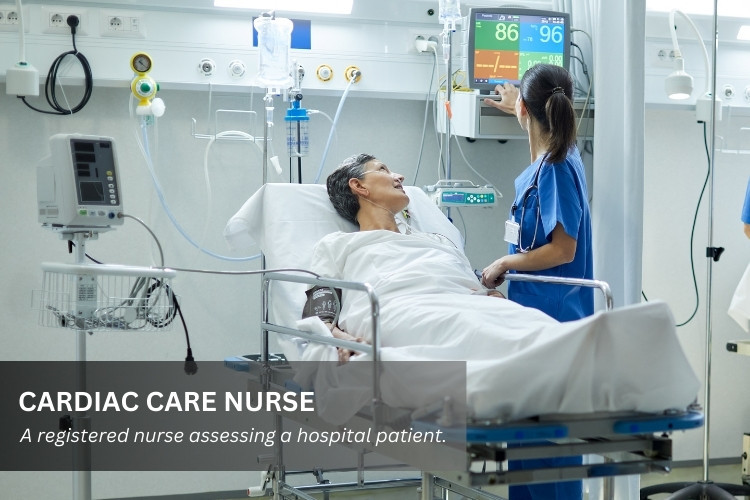Cardiac Care Nurse Career Guide

Overview
What Is a Cardiac Care Nurse?
A Cardiac Care Nurse is a Registered Nurse (RN) who specializes in providing care to patients with heart conditions, such as heart disease, heart attacks, arrhythmias, and heart failure. These nurses work closely with cardiologists and other healthcare professionals to manage and treat patients with cardiovascular diseases, both in acute care settings and in long-term heart disease management.
Cardiac Care Nurses work in hospitals, cardiac units, outpatient cardiology clinics, and rehabilitation centers. They provide a wide range of care from initial assessment and monitoring to administering medications, performing procedures like electrocardiograms (EKGs), and supporting patients post-surgery or during heart-related treatments.
This role requires specialized knowledge of heart disease, the ability to respond quickly to emergencies, and strong communication skills to educate patients on lifestyle changes and disease management.
Education
How To Become a Cardiac Care Nurse
Becoming a Cardiac Care Nurse requires a combination of traditional nursing education, clinical experience, certification, and specialized training in cardiac care. Follow these steps to enter this challenging and rewarding healthcare career:
- Earn a Nursing Degree. Complete an Associate Degree in Nursing (ADN) or a Bachelor of Science in Nursing (BSN). A BSN is preferred, especially for roles in specialized cardiac care settings.
- Pass the NCLEX-RN. Obtain your nursing license by passing the National Council Licensure Examination for Registered Nurses (NCLEX-RN).
- Gain Clinical Experience. Work as a Registered Nurse (RN) in critical care units, medical-surgical units, or cardiology units to gain experience in heart disease management.
- Obtain Specialized Training. Take continuing education courses or attend cardiac care workshops to enhance knowledge in cardiovascular care.
- Optional Certification. Consider earning the Cardiac Vascular Nursing (CVN) certification from the American Nurses Credentialing Center (ANCC) to advance your expertise in cardiac nursing.
How long does it take to become a Cardiac Care Nurse? It typically takes 4-6 years to become a Cardiac Care Nurse, including nursing education, licensure, and clinical experience. Certification in cardiac care can help nurses advance in their careers and stay current with the latest medical advancements in heart disease treatment.
Average Salary
How Much Does a Cardiac Care Nurse Make?
Salaries for Cardiac Care Nurses can vary depending on experience, location, and the type of healthcare facility. On average, a Cardiac Care Nurse can expect to earn between $75,000 and $100,000 annually.
Average annual salary for a Cardiac Care Nurse:
- Entry-level: $75,000 - $85,000 per year.
- Mid-career: $85,000 - $95,000 per year.
- Experienced: $95,000 - $100,000+ per year.
The U.S. Department of Labor reports that Registered Nurses earn an average of $42.00 per hour, or about $87,360 annually. Cardiac Care Nurses working in specialized cardiac units, intensive care, or critical care settings may earn a higher salary due to the level of expertise required.
Job Duties
What Does a Cardiac Care Nurse Do?
Cardiac Care Nurses are responsible for managing the care of patients with heart-related conditions. They assess, monitor, and treat patients with various cardiovascular issues, providing critical care both in emergencies and for long-term management. The most common job duties of a Cardiac Care Nurse include:
- Monitoring Vital Signs. Assess and monitor heart rate, blood pressure, oxygen levels, and electrocardiograms (EKG) to track patients' cardiovascular health.
- Administering Medications. Provide medications, including antihypertensives, anticoagulants, and pain management medications, as prescribed.
- Patient Education. Educate patients on lifestyle changes, such as diet, exercise, and smoking cessation, to improve heart health.
- Cardiac Procedures. Assist with diagnostic tests, such as echocardiograms, stress tests, and catheterization, and support patients during procedures like angioplasty or stent placement.
- Post-Operative Care. Provide care and recovery support to patients who have undergone heart surgery, including monitoring for complications and promoting recovery.
- Managing Heart Failure. Provide ongoing care and monitoring for patients with heart failure, including managing symptoms and preventing hospital readmissions.
- Advanced Duties. Experienced Cardiac Care Nurses may lead educational programs, engage in research, or take on leadership roles within cardiology departments.
Cardiac Care Nurses work closely with cardiologists, surgeons, and other healthcare professionals to deliver comprehensive care for heart disease patients, both during and after hospitalization.
Essential Skills
What Skills Does a Cardiac Care Nurse Need?
Cardiac Care Nurses need specialized knowledge in cardiovascular disease, strong critical thinking abilities, and the ability to perform clinical procedures. They also require excellent communication skills to interact with patients, families, and healthcare teams in emotionally challenging situations. Here are some of the skills a Cardiac Care Nurse needs to succeed:
- Cardiovascular Knowledge. Deep understanding of heart disease, cardiac procedures, and medical treatments used to manage heart health.
- Monitoring and Assessment. Ability to monitor cardiac function through vital signs, lab results, and diagnostic tests like EKGs and echocardiograms.
- Critical Thinking. Make quick, informed decisions during emergencies or complications that arise with patients' cardiac health.
- Patient Education. Effectively explain complex cardiac conditions and treatment plans to patients and their families.
- Pain Management. Help manage pain in patients with heart-related conditions, particularly those recovering from surgery or undergoing procedures like angioplasty.
- Collaboration. Work as part of a healthcare team, collaborating with cardiologists, surgeons, and other nurses to ensure quality patient care.
- Emotional Support. Provide emotional support to patients dealing with the anxiety and stress associated with heart disease, including post-surgery recovery and lifestyle changes.
One of the biggest challenges of being a Cardiac Care Nurse is managing patients with life-threatening heart conditions and ensuring their immediate care while also planning for long-term health. However, this role is deeply rewarding, as it provides the opportunity to make a significant difference in the lives of patients battling heart disease, improving their quality of life and reducing complications over time.
Work Environment
Where Does a Cardiac Care Nurse Work?
Cardiac Care Nurses work in a range of healthcare settings where patients receive treatment for heart conditions. The most common environments include hospital cardiac care units (ICU), intensive care units (ICU), and emergency departments, where they provide critical care to patients experiencing acute cardiac events.
Many also play a key role in outpatient cardiac rehabilitation centers, helping patients recover after heart surgery or manage long-term cardiac conditions. Others work in private cardiology clinics, supporting diagnostic procedures, treatment planning, and follow-up care. Some Cardiac Care Nurses are also involved in cardiac research or education, contributing to clinical studies or training the next generation of nurses.
Common work settings include:
- Hospital Cardiac Care Units (CCU)
- Hospital Intensive Care Units (ICU)
- Hospital Emergency Departments
- Outpatient Cardiac Rehabilitation Centers
- Private Cardiology Clinics
- Cardiovascular Research Facilities
- Nursing Schools and Educational Institutions
In each of these environments, Cardiac Care Nurses collaborate closely with cardiologists, surgeons, and other healthcare providers. Their specialized training in cardiovascular care allows them to deliver high-level support in both acute and chronic care settings.
Last updated: July 21, 2025
References:
- Associate of the American College of Cardiology. American College of Cardiology Foundation, Become an ACC Member. Retrieved July 21, 2025.
- Cardiac Vascular Nursing Certification. American Nurses Association, American Nurses Credentialing Center. Retrieved July 21, 2025.
- CHFN for the Clinical RN or Non-Clinical RN. American Association of Heart Failure Nurses, Certification. Retrieved July 21, 2025.
- Registered Nurses. Bureau of Labor Statistics, U.S. Department of Labor. Occupational Outlook Handbook. Retrieved July 21, 2025.
- What Is a Cardiac Nurse. Indeed, Career Guide. Retrieved July 21, 2025.
- Cardiac Care Nurse. Johnson & Johnson, Nursing Careers. Retrieved July 21, 2025.
- Cardiac Care Nurse. PayScale, Browse Jobs by Industry. Retrieved July 21, 2025.


